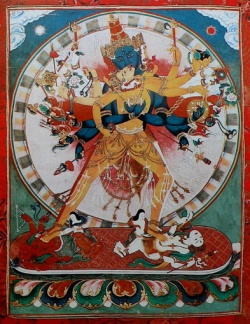Bhutashuddhi
The term Bhūtaśuddhi (भूतशुद्धि) has a much more extended application in the realm of tantrism, where it also forms an important element of worship and initiation. In tantric ritual, bhūtaśuddhi refers to the preliminary purification of the divinities residing in each of the five elements (bhūtas) that make up the body.
Here, bhūtaśuddhi is the purification of both a mesocosmic worship site—once again referred to as a “field,” kṣetra—and the microcosmic body of the worshipper himself (when the two are not identified), a situation that mirrors that of the twofold Vedic preparation of sacrificial ground and the sacrificer’s person Both are dessicated, “blown out,”
and burned up before being cleansed with water and flooded with “nectar,” processes which, identified with the dissolution of the mundane self, constitute the first step towards the creation of a new divinized self. Here, the lower elements of earth, water, fire, and air, are successively imploded into their higher emanates, until there only remains the
most sublime element n the pentadic hierarchy. This is ether, the empty space left by this dissolution, within which the tantric practitioner will establish, through visualization techniques and the planting of seed mantras (bīja), a new world at the center of which he will construct the bod of that divinity with whom he will come to identify himself.
